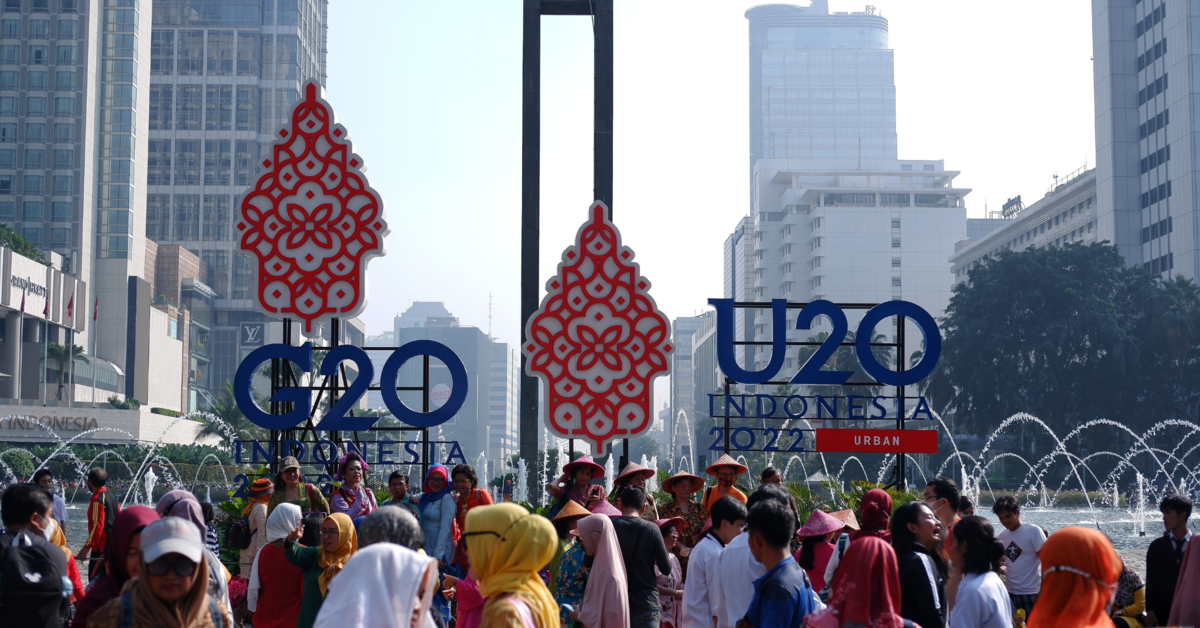At A Glance
-
On Tuesday, Indonesian Parliament (DPR RI) ratified the Criminal Code Bill (RUU KHUP) as its new Criminal Code Law (KUHP) – over a decade in coming to replace the current criminal code, deemed as outdated and colonial [Wetboek Van Strafrecht voor Nederlandsch-Indie (WvS)].
-
The criminal code has several controversial articles that sparked criticism from the drafting process. These articles include stipulations on defamation and insults, insulting the president or state institutions, expressing views counter to state ideology, and cohabitation. Corporate accountabilities are also subject to the new Criminal Code.
-
With the ratification of the bill despite criticisms of the controversial articles, elements of society are concerned about threats to freedom of expression and potential criminalization.
-
During the law’s three-year transition period, corporations are advised to engage the Ministry of Law and Human Rights and other related ministries, either directly or through associations and business chambers, to provide inputs on implementing regulations, in particular those related to corporate crimes, to avoid them negatively affecting businesses in Indonesia.
Indonesia’s New Criminal Code Law
The draft for Indonesia's Criminal Code Bill (RUU KHUP) was approved by the Indonesian Parliament (DPR RI) on December 6, 2022, and ratified as a new Criminal Code Law (KUHP). The Bill has been in discussion for over ten years, as Indonesian governments have been pushing for an overarching criminal code to replace the current one, deemed an outdated colonial criminal code (Wetboek Van Strafrecht voor Nederlandsch-Indie (WvS)). The new criminal code seeks to decolonize the legal system, democratize the criminal law, consolidate existing laws consisting of criminal penal codes, and adapt and harmonize the criminal justice system.
During the plenary that passed the law, several political parties expressed opinions on the draft Criminal Code, despite continuing to agree on its ratification into law.
-
According to the Prosperous Justice Party (PKS) faction, Article 240 of the new law must be repealed because this article will take away people's rights to express their opinions. PKS also said that article 218 could prevent the public from criticizing the president.
-
According to the Democratic Party faction, the KUHP must guarantee people's rights, especially the right to freedom of expression, so the government must be careful in its implementation. In addition, the protection of rights and education for law enforcers that must be prioritized by the government after the ratification of the RKUHP.
The passing of the Criminal Code Bill into law means a renewal of the definition of criminal acts in Indonesia. The Indonesian government introduced the law with the objective of updating the relevance of the former criminal code clauses – passed in 1918 – into the present context. The reformation of the articles and clauses is crucial, yet there are prevailing issues within the articles that sparked criticism from civil society groups, the press and business associations.
Controversial Articles
Even during the drafting process, the draft law drew a number of comments due to several controversial stipulations.
Defamation. On November 2021, Mary Lawlor, UN Special Rapporteur on the situation of human rights defenders, spoke out against Indonesia's criminalization of defamation. She said that civil society organizations are being targeted for performing their job. She also argues that defamation should be treated as a civil matter, not a crime, which reflects the call from a number of UN bodies to remove defamation from Indonesia's criminal code.
Cohabitation. Among the most controversial revisions to the code are articles that would penalize sex outside of marriage with up to one year in jail and prohibit cohabitation between unmarried couples without a clear explanation of the definition of “cohabitation” (Art.411-412). The controversial new laws, which apply to Indonesians and foreigners alike, include a ban on insulting the president or state institutions (Art. 218) and expressing views counter to state ideology (Art 188-190).
The law passed even as business groups warned it could harm Indonesia's image as a tourism and investment destination.
At a press conference late October, Indonesian Employers Association (Apindo) chairman Hariyadi Sukamdani said he feared that the controversial provision could disrupt the country’s tourism industry. "It can be understood that the criminal provision on fornication is related to moral behavior; however, that activity belongs in the private sphere and should not be regulated by law or considered a crime," Hariyadi told the press on Thursday, as quoted by Antaranews.com.
Indonesian Human Rights Commission concerns. On November 30, 2022, the Indonesian Human Rights Commission (Komnas HAM) urged the parliament to remove an article on genocide and humanitarian violations (Art. 598) from the bill. Komnas HAM also called on legislators to remove the requirements of articles regarding freedom of religion (Art. 300-305), articles about abortion (Art. 463-465) over a concern that it discriminates against women, and articles about defamation of the president and vice president (Art. 218). Komnas HAM also sees articles about hoaxes and on insult, slander, and defamation (Art. 263-264, 433-439) as against the constitution and potentially restricting of freedom of expression.
Civil Society Coalition on KUHP concerns. In addition to the above, the Civil Society Coalition on KUHP states that dozens of stipulations in the new Criminal Code are problematic and controversial. Among them are:
-
Articles related to living laws or laws that live in society. The Coalition considers these articles as opening loopholes for abuse of customary law as the implementation of sacred customary law is no longer left to the indigenous peoples’ authority as it shifts to the state (Art 2, 597).
-
The new law still includes the death penalty as a form of criminal punishment (Art 67, 98-102).
-
Concerning the contempt of court or respect for the judiciary, the Coalition considers this rule to be problematic because there is no detailed explanation of the phrase "law enforcement" (Art 280).
-
Rules regarding gross human rights violations see that the non-retroactive element has been omitted, making it impossible to prosecute past and present gross human rights violations that existed before the new law was passed (Art 598-599).
-
The article on cohabitation is seen as portraying victims of sexual harassment as perpetrators (Art 411-413).
-
The new law is seen as not creating a criminal threat and is, thus, not a deterrent on corruption (Art 603-606).
-
Articles that prohibit the showcasing of birth control devices to children state that only authorized officers and volunteers selected by the government may provide education on birth control devices or contraceptives to children (Art 408-410).
-
Stipulations on the punishment of defamation and hoaxes through electronic means overlap with the Electronic Information and Transaction (ITE) Law, which may impose legal uncertainty (Art 441).
Corporate Crime
The new Criminal Code contains a number of legal paradigms that are quite progressive. One of them is related to the mechanism of corporate punishment in Article 118-123. Previously, the mechanism for corporate punishment was only governed by the Supreme Court regulation (Perma) No.16/2016 concerning Procedures for Handling Corporate Crime.
-
Criminal conduct is defined as a crime conducted by a corporation’s employees who are bound with a work contract and representing the corporation’s business or activities (Art 46).
-
Liability for corporate crimes can be imposed on corporations, administrators who have functional positions, give orders, control holders, or even beneficial owners of corporations (Art 46 and 47).
-
Corporate criminal sanctions are divided into two: main penalty in the form of fines, and additional penalty in the form of compensation, reparation of damages caused by criminal conduct, fulfillment of customary obligations, and training financing (Art 120).
-
The amount and extensions of the sanctions will depend on the form of the criminal offenses, the involvement of government officials, the value of law and justice that lives in society, the track record of corporations, and the influence of punishment on corporate cooperation in criminal handling (Art 56).
-
Corporate crime only applies if a crime falls within the scope of a business or activity specified in the articles of association or other provisions applicable to corporations, unlawfully beneficial to corporations, or accepted as corporate policy (Art 48).
-
Corporate crime also applies if the company does not take steps to prevent or avoid the occurrence of a crime, including allowing a crime to occur (Art 48).
The new Criminal Code does not explain thoroughly the technical aspects of how specific sanctions will be applied and under what conditions. The code says that this will be further stipulated through Government Regulations (Peraturan Pemerintah – a derivative law of the Criminal Code) (Art 124).
Public Response to the New Criminal Code
A coalition of legal experts and civil society groups, under the National Alliance of Criminal Code Bill Reform, campaigned to cancel the ratification of the Criminal Code Bill and they called for increased scrutiny on several controversial articles of the new criminal code in engagement with media outlets and on Twitter.
The Press Legal Aid Society (LBH Pers in Bahasa Indonesia) also held a demonstration in front of the House of Representatives on December 5, 2022, to protest the ratification of the Criminal Code due to concerns over press freedom. Press members are worried about the potential criminalization of journalists as Article 263 addresses the spread of misinformation without a clear extent or certainty of what counts as hoaxes. Various groups later attended the demonstration, including NGOs, legal aid organizations, indigenous groups, students, workers, environmental activists and women's groups.
Alliances of groups opposing the bill's passing were mainly concerned about threats to freedom of expression and potential criminalization that have previously occurred with an existing Defamation Law that has multiple interpretations of the clause's definition of insult. Opponents of the bill have highlighted articles they say are socially regressive, will curb free speech, and represent a "huge setback" in ensuring the retention of democratic freedoms after the fall of authoritarian leader Suharto in 1998.
Bivitri Susanti, a constitutional law expert from the Jakarta-based Jentera School of Law, said those articles on customary law, blasphemy, protesting without notification, and spreading views divergent from the Pancasila were all legally problematic because they could be widely interpreted.
The Center for Indonesia's Strategic Development Initiatives (CISDI) conveyed criticism of the health articles in the Criminal Code because they can potentially negatively impact public health and HIV prevention.
Indonesia’s Judicial Research Society (IJRS) said there is a potential legal uncertainty through the corporate criminal code scheme as it depends on individual accountability, and it creates issues for accountability attributes at the corporate level. In terms of organizational accountability, penalties for corporate criminal code could take the form of the corporate’s compliance policies and/or Standard Operational Procedures (SOP), failure of due diligence, and failure to take reactive steps toward certain issues.
What’s Next?
Once ratified, the new code will come into effect in three years' time as the government and related institutions draft related implementing regulations.
Due to significant protests associated with ratification, the Minister of Law and Human Rights, Yasonna Laoly, suggested that the public file a complaint through the constitutional court if they would like to amend controversial articles in the law.
Corporations are advised to engage the Ministry of Law and Human Rights and other related ministries, either directly or through associations and business chambers, during the law’s three-year transition period to provide inputs to drafting the implementing regulations, in particular those related to corporate crimes, to avoid them negatively affecting businesses in Indonesia.
Further Reading
Finalized Criminal Code Bill – December 6, 2022
Why is Indonesia’s new criminal code so controversial? – Reuters
Indonesia’s criminal code bans more than premarital sex
Press release of UN Special Rapporteur towards Indonesia’s defamation law



